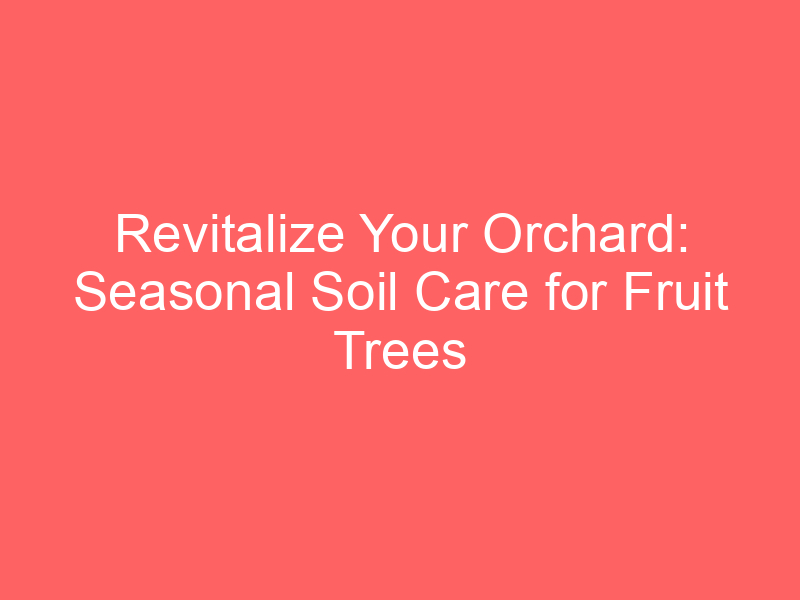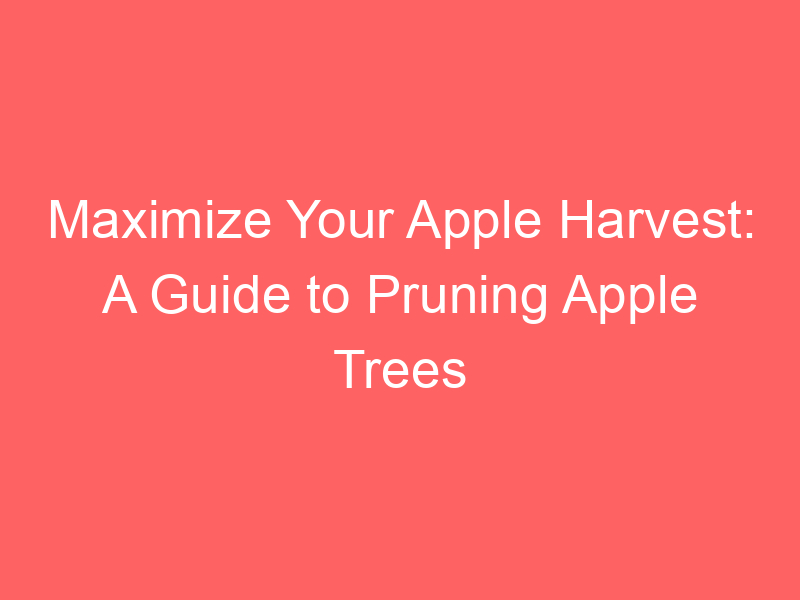Introduction to Soil Preparation for Fruit Trees
Planting a fruit tree is a rewarding experience, but it requires careful preparation. The soil, in particular, plays a crucial role in the tree’s growth and fruit production. This section will delve into the importance of soil preparation and understanding the specific soil requirements of fruit trees.
-
- The Importance of Soil Preparation
Soil preparation is a fundamental step in establishing a healthy and productive fruit tree. The soil serves as the primary source of nutrients for the tree. It also provides the necessary support for the tree’s root system. Preparing the soil properly ensures that the tree has access to the nutrients it needs and can establish a strong root system. This, in turn, leads to a healthier tree and a more abundant harvest.
-
- Understanding the Fruit Tree Soil Requirements
Each type of fruit tree has its own specific soil requirements. These requirements can include the soil’s pH level, its texture, and its nutrient content. For example, apple trees prefer slightly acidic soil, while cherry trees thrive in alkaline soil. Understanding these requirements is crucial for choosing the right type of soil for your fruit tree and for making any necessary adjustments to the soil before planting.
By paying attention to soil preparation and understanding the unique soil requirements of your chosen fruit tree, you can increase your chances of a successful harvest. In the following sections, we will delve deeper into the techniques and steps involved in soil preparation for fruit trees.
Understanding the Basics of Soil Preparation Techniques
For a fruitful harvest, understanding the basics of soil preparation techniques is essential. One of the key steps in this process is soil testing.
Soil Testing
Soil testing is a critical step in preparing your soil for planting fruit trees. It helps you understand the composition of your soil and what it needs to be fertile and healthy.
-
- Why soil testing is crucial for planting fruit trees
Soil testing is crucial for planting fruit trees because it allows you to know the nutrient content, pH level, and other important factors of your soil. This information is vital because different fruit trees require different soil conditions to thrive. For example, apple trees prefer slightly acidic soil, while peach trees thrive in alkaline soil. Without soil testing, you might end up planting your fruit trees in unsuitable soil, leading to poor growth and low yield.
-
- How to conduct a soil test
Conducting a soil test is quite simple. You can purchase a soil testing kit from a local garden center or online. The kit usually contains a set of instructions that you need to follow. Generally, you will need to collect a soil sample from your garden, mix it with a testing solution, and then compare the color of the solution to a color chart provided in the kit. This will give you a rough idea of the nutrient content and pH level of your soil. For a more accurate result, you can send your soil sample to a professional soil testing lab.
The soil testing is a fundamental part of soil preparation techniques. It provides valuable information about your soil, which can guide you in making the right decisions when it comes to planting and caring for your fruit trees.
Soil Amendments for Fruit Trees
When it comes to growing fruitful and healthy trees, the soil plays a significant role. It’s not just about planting the tree; it’s about ensuring the soil is rich and nourishing for the tree to thrive. This is where soil amendments come into play.
-
- Understanding the role of organic matter
Organic matter is a critical component of fertile soil. It’s the decomposed plant and animal material that enriches the soil with essential nutrients. Organic matter improves soil structure, making it easier for roots to penetrate. It also enhances the soil’s ability to hold onto water and nutrients, providing a steady supply to the tree. Organic matter is like the food your fruit trees need to grow and produce bountiful harvests.
-
- Best soil amendments for fruit trees
There are several soil amendments beneficial for fruit trees. Here are a few:
-
-
- Compost: It’s rich in nutrients and beneficial microorganisms that improve soil health.
- Manure: It’s a great source of nitrogen, a nutrient essential for plant growth. However, ensure it’s well-rotted before use.
- Bone meal: It provides phosphorus, which is crucial for root development and fruiting.
- Green manure: These are crops grown and then plowed back into the soil. They add organic matter and nutrients to the soil.
-
The best soil amendments for your fruit trees will depend on the current condition of your soil. Therefore, a soil test is recommended before adding any amendments.
Preparing Ground for Orchard: Step-by-Step Guide
Starting your own home orchard can be a rewarding experience. However, it requires careful planning and preparation. Here is a step-by-step guide to help you prepare the ground for your orchard.
-
- Choosing the right location
The first step in preparing your orchard is selecting the right location. The best spot for your fruit trees is one that gets at least six hours of sunlight each day. The area should also be well-drained to prevent waterlogging. Remember, different fruit trees have different sunlight and soil requirements, so do your research before making a decision. Wikipedia has a comprehensive list of fruit trees and their growing conditions.
-
- Testing and amending the soil
Next, you need to test the soil. This will help you understand its pH level, nutrient content, and texture. You can purchase a soil testing kit from your local garden store or online. If the soil lacks essential nutrients or has an inappropriate pH level, you may need to amend it. This could involve adding compost, lime, or sulfur to improve its fertility and pH balance.
-
- Preparing the planting hole
Once you’ve amended the soil, it’s time to prepare the planting hole. The hole should be twice as wide and just as deep as the root ball of the tree. This gives the roots plenty of room to spread and grow. Remember to remove any rocks or debris from the hole before planting.
-
- Planting the fruit tree
Now you’re ready to plant your fruit tree. Place the tree in the center of the hole, making sure the top of the root ball is level with the ground. Then, backfill the hole with the soil you removed, pressing it down gently to remove any air pockets. Water the tree thoroughly after planting.
-
- Post-planting care
After planting, your fruit tree will need some care to help it establish. This includes regular watering, mulching around the base of the tree to conserve moisture and suppress weeds, and pruning to shape the tree and encourage healthy growth.
Best Soil for Different Types of Fruit Trees
Preparing Soil for Apple Trees
Apple trees are a popular choice for home orchards due to their bountiful harvests and the versatility of their fruit. However, to ensure a healthy tree and a plentiful harvest, it’s essential to understand the soil requirements and amendments needed for apple trees.
-
- Soil requirements for apple trees
Apple trees thrive in well-drained soil with a pH level between 6.0 and 7.0. They prefer loamy or sandy soil that is rich in organic matter. Poorly drained or heavy clay soils can lead to root diseases and inhibit growth. If you’re unsure about your soil’s pH level, consider getting a soil test done. This will give you a clear understanding of your soil’s current state and what amendments may be needed.
-
- Best soil amendments for apple trees
Amending your soil can greatly improve its quality and make it more suitable for apple trees. Compost, well-rotted manure, or leaf mold can be added to increase the organic matter in the soil. To adjust the pH level, use lime to raise it or sulfur to lower it. Remember, it’s important to mix these amendments into the soil rather than just adding them on top. This ensures that the nutrients are evenly distributed and can be easily accessed by the tree’s roots.
Preparing the soil correctly for your apple trees can make a significant difference in their health and productivity. By understanding and meeting their soil requirements, you’re setting the stage for a successful home harvest.
Soil Requirements for Other Popular Fruit Trees
Understanding the specific soil needs of your fruit trees is crucial for their healthy growth and bountiful harvest. Let’s explore the soil requirements for citrus, peach, and cherry trees.
- Citrus Trees: Citrus trees, including oranges, lemons, and grapefruits, thrive in well-draining soil. They prefer slightly acidic soil with a pH between 6.0 and 7.0. Sandy loam or clay loam is ideal for these trees. Organic matter, such as compost or well-rotted manure, can be added to improve soil fertility.
- Peach Trees: Peach trees require well-drained, loamy soil with a pH between 6.0 and 7.0. They are sensitive to water-logging, so avoid heavy clay soils. Regular additions of organic matter can enhance soil structure and nutrient content.
- Cherry Trees: Cherry trees prefer deep, well-drained loamy soil. They can tolerate a wide pH range, from 5.5 to 7.5. However, they perform best in slightly acidic to neutral soil. Adding organic matter can improve soil fertility and moisture retention.
The soil preparation is a crucial step in ensuring a healthy and productive fruit tree. By understanding and meeting the specific soil requirements of your trees, you can look forward to a rewarding home harvest.
Organic Soil Preparation: A Sustainable Approach
When it comes to growing fruit trees, the soil you use can make a significant difference. Organic soil preparation is a sustainable approach that can yield numerous benefits. Let’s delve into the advantages of organic soil preparation and how you can prepare it for your fruit trees.
-
- Benefits of Organic Soil Preparation
Organic soil preparation is a method that focuses on using natural materials to enrich the soil. This approach has several benefits:
-
-
- Improved Soil Structure: Organic matter improves the structure of the soil, making it easier for roots to penetrate. This leads to healthier, stronger fruit trees.
- Nutrient Rich: Organic soil is rich in essential nutrients that fruit trees need to grow and produce bountiful harvests.
- Environmentally Friendly: Organic soil preparation is sustainable and eco-friendly, reducing the need for chemical fertilizers and pesticides. This helps protect the environment and promotes biodiversity.
- Improved Water Retention: Organic soil can retain more water than conventional soil, reducing the need for frequent watering and helping your fruit trees thrive even in dry conditions.
- How to Prepare Organic Soil for Fruit Trees
-
Preparing organic soil for your fruit trees involves a few simple steps:
-
- Compost: Start by making or buying compost. This is a rich source of organic matter that will nourish your soil. You can make compost from kitchen scraps, yard waste, and other organic materials.
- Soil Amendment: Next, amend your soil with the compost. This involves mixing the compost into your existing soil to improve its structure and nutrient content.
- Mulching: After planting your fruit trees, apply a layer of organic mulch around the base of the trees. This helps retain moisture, suppress weeds, and add more organic matter to the soil as it decomposes.
- Regular Maintenance: Maintain your organic soil by regularly adding more compost and organic matter. This will ensure that your soil remains rich and fertile, providing the best possible conditions for your fruit trees.
The organic soil preparation is a sustainable and effective way to grow fruit trees. By following these steps, you can create a fertile and healthy environment for your trees, leading to bountiful harvests and a thriving home orchard.
Common Mistakes in Soil Preparation and How to Avoid Them
As we delve into the world of soil preparation for fruit trees, it’s crucial to be aware of common mistakes that can hinder your tree’s growth and productivity. Let’s explore these pitfalls and learn how to avoid them.
-
- Over-fertilizing the soil
While it’s true that fruit trees need nutrients to grow and produce, too much of a good thing can be harmful. Over-fertilizing can lead to excessive leaf growth at the expense of fruit production. It can also cause nutrient imbalances and even burn the roots. To avoid this, it’s important to use a balanced fertilizer and follow the recommended application rates. It’s also a good idea to have your soil tested periodically to ensure it has the right nutrient levels.
-
- Ignoring soil pH
Soil pH is a critical factor in soil health and nutrient availability. Many fruit trees prefer slightly acidic soil, but the ideal pH can vary depending on the type of tree. Ignoring soil pH can lead to nutrient deficiencies or toxicities. To avoid this, test your soil’s pH before planting and adjust it as necessary using lime to raise pH or sulfur to lower it. Regular testing and adjustment can help maintain optimal pH levels for your fruit trees.
-
- Planting trees too deep
Planting a tree too deep can lead to a host of problems, including poor root development and susceptibility to pests and diseases. The tree’s root flare (where the trunk widens at the base) should be visible above the soil surface. To avoid planting too deep, dig a hole that is twice as wide as the root ball but no deeper. Place the tree in the hole, making sure the root flare is level with or slightly above the ground. Backfill with soil, firm it gently, and water thoroughly.
By avoiding these common mistakes, you can create a healthy soil environment that will support your fruit trees and help them thrive. A successful soil preparation is a key step towards a bountiful home harvest.
Case Study: Successful Soil Preparation Techniques
Let’s delve into two real-life examples that illustrate the power of proper soil preparation in growing fruitful trees. These case studies will provide you with practical insights and proven techniques that you can apply in your own garden or orchard.
-
- Case study 1: A successful apple orchard
Our first case study takes us to a thriving apple orchard in Washington State, USA. This orchard, spanning over 50 acres, is known for its juicy and flavorful apples, thanks to the meticulous soil preparation techniques employed by the orchard owner.
The owner, Mr. John, believes that the secret to his bountiful harvests lies in the soil. He starts preparing the ground a year before planting the apple saplings. The soil is first tested to determine its pH level and nutrient content. Based on the results, Mr. John adds organic compost, lime, and other soil amendments to achieve the ideal soil composition for apple trees, which is slightly acidic (pH 6.0 to 7.0).
He also practices crop rotation and cover cropping to maintain soil health and prevent diseases. This careful and systematic approach to soil preparation has resulted in a successful apple orchard that yields over 10,000 bushels of apples each year.
-
- Case study 2: Organic soil preparation in a home garden
Our second case study features Mrs. Smith, a home gardener from Florida, USA. Mrs. Smith is an advocate of organic gardening and has been growing a variety of fruit trees in her backyard for over a decade.
Mrs. Smith prepares her garden soil by incorporating organic matter, such as compost and well-rotted manure, into the soil. She also uses mulch to retain soil moisture and suppress weeds. To maintain soil fertility, she practices composting and vermicomposting at home, turning kitchen scraps and yard waste into nutrient-rich compost for her garden.
Despite the small size of her garden, Mrs. Smith enjoys a plentiful harvest of fruits, including oranges, lemons, and peaches, every year. Her success story is a testament to the effectiveness of organic soil preparation in a home garden setting.
These case studies underscore the importance of soil preparation in growing healthy and productive fruit trees. Whether you are managing a large orchard or a small home garden, the right soil preparation techniques can make a significant difference in your harvests.
Conclusion: The Key to Bountiful Harvests
As we wrap up this comprehensive guide on soil preparation for fruit trees, it’s essential to remember that the key to a bountiful harvest lies in the groundwork. The soil is the foundation of your fruit trees, and its health directly influences the quality and quantity of your harvest.
-
- Recap of soil preparation techniques
We’ve discussed several techniques for preparing the soil for fruit trees. These include understanding the basics of soil preparation, such as the importance of soil pH and nutrient content. We’ve also delved into the step-by-step guide for preparing the ground for an orchard, highlighting the need for proper site selection, soil testing, and soil amendment. We’ve explored the best soils for different types of fruit trees and the benefits of organic soil preparation. Lastly, we’ve identified common mistakes in soil preparation and how to avoid them.
-
- Final thoughts on preparing soil for fruit trees
Preparing the soil for fruit trees is a labor of love that requires patience, knowledge, and a bit of elbow grease. But the rewards are well worth the effort. A well-prepared soil will provide your fruit trees with the nutrients they need to grow and produce a bountiful harvest. Remember, the key to a successful harvest is not just about choosing the right fruit trees, but also about providing them with the right soil conditions. So, take your time, do your research, and prepare your soil well. Your future harvests will thank you for it.
The success of your home orchard is largely dependent on the quality of your soil preparation. As the saying goes, “The best time to plant a tree was 20 years ago. The second best time is now.” So, don’t wait any longer. Start preparing your soil today, and look forward to the bountiful harvests that await you.






